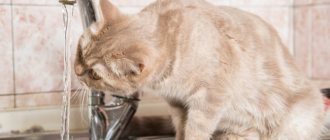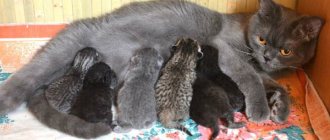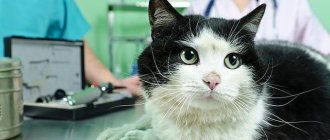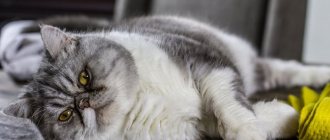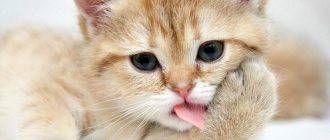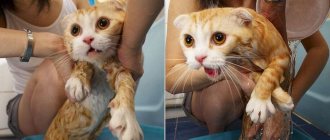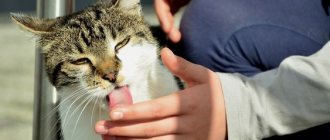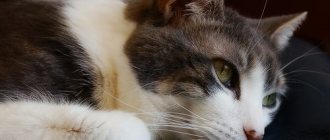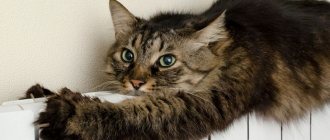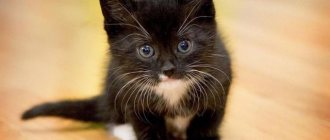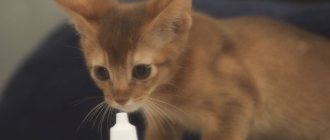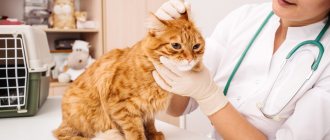State of stress
Stress is a fairly common cause of weight loss. To cope with stress, it is necessary to eliminate the cause of its occurrence. The cat must be left alone for a while, she must come to her senses and understand that she is not in any danger. As a last resort, you can give the animal mild sedatives.
Everything in the house needs to be returned to its place, without disturbing the animal’s usual schedule. Feed from the same dishes and the same food, and this should be done by the same person as before. When the animal calms down and sees that everything in her life has improved, she will begin to eat normally and gain weight again.
Stress is a fairly common cause of weight loss. To cope with stress, it is necessary to eliminate the cause of its occurrence. The cat must be left alone for a while, she must come to her senses and understand that she is not in any danger. As a last resort, you can give the animal mild sedatives.
Why is the kitten thin and growing poorly?
The moderately well-fed cat suddenly began to eat poorly and lose weight.
The first and main reason for a cat’s refusal to eat is the presence of a source of inflammation or other disease. Therefore, such a condition can be regarded as a symptom that requires special attention. The reasons for an animal’s refusal to eat food or water are divided into psychological and medical.
Many diseases in a cat can appear after stress. In this case, they say that the cat was latently infected.
If the basis is a psychological factor, then appetite is completely absent. This may happen for the following reasons:
- moving to another place;
- change of owner;
- the appearance of a new person in the environment;
- change of diet.
The body may experience inflammatory processes, disturbances in the functioning of internal organs, and blood diseases. Painful and unpleasant sensations also affect lack of appetite and refusal to eat. Such reasons are cause for concern and immediate contact with a veterinarian.
Increased salivation may be a sign of an incipient disease.
Cat's gastrointestinal tract.
Such symptoms may indicate problems with the gastrointestinal tract - indigestion, problems with internal organs.
Each of the possible diseases requires specific therapy, which can be developed solely based on the results of the tests.
articleTheodora11 months ago
Immediately after birth, the body's systems have not yet matured and learned to work at full capacity. That is why any minor violation can lead to serious consequences. A thin kitten is not such a rare occurrence, often leading to developmental delays and death of the animal. For what reasons can a baby develop malnutrition?
Throughout their lives, cats may lose interest in food for periods of time. There are several reasons why a cat eats poorly and loses weight. This behavior in a pet may be associated with a behavioral disorder or physiological characteristics.
In some cases, loss of appetite indicates serious diseases of the internal organs caused by chronic illnesses or infections. Reasons not related to diseases that cause a cat to eat little and lose weight are the following:
- The period of estrus and puberty. As a result of a strong hormonal surge, the pet's behavior changes dramatically - the cat shows aggression and becomes overly excited. Temporary anorexia during this period is not a pathology and should not cause concern to the owner. Without planning to have offspring from your furry pet in the future, veterinary experts recommend routine sterilization. Thus, it will be possible to avoid not only manifestations of sexual desire, but many related problems.
- Accumulation of hairballs in the stomach. The reason that a cat is losing weight and also eating little may be hairballs - trichobezoars - that have accumulated in the stomach. Under normal conditions, excess hair passes through the intestinal tract and is excreted in the feces. If the hairballs are too large, your pet cannot regurgitate them and the stomach becomes clogged and stretched. As a result of this, the cat eats little and loses weight, the animal retains stool, and the fur becomes unkempt.
- Stressful conditions of the animal. It happens that the animal looks absolutely healthy, its behavior does not change, except for refusing food. The reasons may be hidden in the psycho-emotional state of the pet. Stress in a cat can occur due to the appearance of another animal in the house or a small child, as well as during moving, punishment or after quarrels between animal owners.
- Feeding irregularities. Quite often, cat owners make the mistake of suddenly switching their pet to a new food. This may cause you to refuse food. To avoid this behavior in a cat, veterinarians recommend accustoming or switching the animal to a new type of food gradually. Feed must be fresh, without violations in storage technology. Cats refuse to eat spoiled food, as they naturally have a highly developed sense of smell.
- Age problems. Old cats become picky eaters, they are more likely to experience loss of appetite and associated weight loss. After the age of six, changes occur in the animal’s body and the process of assimilation of food changes. In addition, animals at an advanced age are often diagnosed with diseases of the teeth and gums. Inflammatory processes in the oral cavity lead to the fact that the animal tries to eat less, the cat loses weight and looks quite exhausted. The owner of an old animal is recommended to contact a veterinarian and consult about the selection of a new diet. Older cats prefer wet and soft food.
- Foreign objects in the mouth. When sharp objects eaten by a cat (bones, chips, blades of grass) become stuck, the animal refuses to feed due to the onset of the inflammatory process and severe pain. Foreign objects are especially often found in a kitten’s mouth, because due to their curiosity, babies try to taste everything. The pet looks hungry, meows pitifully, but at the same time cannot fully absorb food. This provokes weight loss and lethargy of the animal. It is important to promptly contact a veterinarian for assistance.
There are a number of diseases that affect the disturbance of appetite in an animal. Thus, various helminthiases and dangerous infectious diseases provoke the appearance of many symptoms, including nutritional disorders. Cats with helminth infections not only lose interest in food, but they may develop a perversion of taste preferences.
Among the infectious diseases that can cause a cat to refuse to eat are the following:
- Rabies. A dangerous disease characterized by refusal of food and severe depression of the animal’s general condition in the first stages. With the development of symptoms, hypersalivation, clouding of the cornea of the eye, exhaustion, eruption of gastric contents, and diarrhea with blood appear.
- Plague. An infectious disease that provokes an increase in body temperature to high levels, a sharp refusal to eat food and water, the appearance of vomiting and diarrhea.
- Leukemia virus. Against the background of a general weakening of the body’s immune forces, the cat develops inflammatory processes in the oral cavity (stomatitis, gingivitis), the functioning of the digestive system is disrupted, the body temperature rises, and the lymph nodes enlarge. The pet refuses to eat, loses weight sharply and loses interest in what is happening around.
- Viral enteritis. They cause disturbances in the gastrointestinal tract, causing profuse vomiting and diarrhea with mucus and blood. The cat refuses not only food, but also water. Dehydration develops quite quickly, the cat loses strength and may die without medical intervention.
READ Caring for an aquarium at home
Loss of appetite is also caused by disturbances in the internal systems of the body that are not associated with infectious agents. Thus, the cause of loss of appetite and sudden weight loss in a cat may be diseases of the hepatorenal system (lipidosis, urolithiasis), diabetes mellitus, inflammatory processes in the intestines of an idiopathic nature.
One of the reasons for refusing food is cat poisoning. Intoxication of the body can occur as a result of a cat eating poisonous plants or poor-quality food. In addition, household chemicals and zoocoumarins (substances used to bait rodents) can cause poisoning. All types of poisoning, even medicinal ones, are accompanied by refusal of food and general lethargy of the cat’s body.
ACS diagnostics
To accurately determine the cause of a change in behavior in a cat, a complete examination is necessary. Unfortunately, both diagnosis and treatment of behavioral problems are often complicated by the presence of various diseases in the animal. And sometimes a combination of pathologies makes behavioral disorders especially severe.
On the other hand, sometimes behavioral symptoms that are actually caused by a serious illness are attributed to cognitive dysfunction syndrome.
The owner’s task is to identify “abnormalities” in the pet’s behavior and promptly report them to the doctor. In addition to changing behavior, it is important to monitor the amount of food and water consumed, weight loss, frequency of bowel movements and urination, etc.
And, of course, older animals need to regularly (1-2 times a year, more often with significant deviations) visit the veterinary clinic for a comprehensive examination (measurement of body weight, blood pressure, determination of the condition of the retina, concentration of thyroid hormones, physical activity, orthopedic and neurological examination, ultrasound diagnostics, tests and blood tests (general and biochemical), urine, etc.).
Dear owners! Timely detection of the disease and its correct treatment mean extended years of life for your pet.
New food introduced
Very often, the reason for losing weight is a change in diet. The animal’s body simply does not absorb the food, although the pet eats it in the same volumes. Most often this is noticeable when the owner tries to suddenly change the diet, for example, switching from homemade food to dry food. It is worth considering that all changes in diet should be gradual and strictly monitored. If something alarms you or significant changes are noticeable, you need to show the animal to a specialist as soon as possible.
To answer this question, your veterinarian will need to examine your cat and, based on her body type and size, determine what weight would be ideal for her. Specially developed formulas and graphs will help him with this, thanks to which he can also calculate how many calories the animal should receive in order to reach this weight without harm to health.
On average, an adult domestic cat should weigh 3.6 – 4.4 kg. Depending on the degree of obesity, your doctor may recommend first achieving an intermediate weight, which is slightly larger than your ideal weight. For example, if your cat weighs around 8kg, her ideal weight would be 4.4 – 5.5kg, but a more realistic target would be an intermediate weight of 6.8kg.
Once it has been achieved, it is necessary to re-evaluate the pet’s condition and determine whether the cat should lose weight further. The weight loss formula for cats is based on the cat's resting energy requirement (the number of calories a cat needs when not physically active, or PEED), which is calculated as follows:
- Method: PEPP in kcal/day = 70 x (ideal weight in kg) x by ¾;
- Method: PEPP in kcal/day = 30 x (total weight in kilograms) 70.
Since cats are obligate carnivores, human diets are not suitable for them. A diet high in protein and low in carbohydrates should help your cat lose weight. This is exactly the food you need to choose.
The amount of food needed to provide the required amount of calories depends on its calorie content. Usually the calorie content of the food is indicated on the packaging, and a specialist will explain to you what portions it should be given.
Usually, a cat loses weight most effectively by receiving dietary canned or dry food several times a day. You can’t leave it in a bowl while losing weight, because regular meals are healthier than constant snacking throughout the day. How to make a cat lose weight if it always has the opportunity to crunch on something out of boredom or for pleasure?
You may find a better solution to the problem, but here are some tips to get you started:
- Feeding cats separately is the ideal solution for such cases. Give your losing cat some diet food in one room and feed the rest in another. When the time allotted for a meal is over - usually from fifteen minutes to half an hour - remove what the animals did not eat until the next feeding.
- Feed a cat that is not overweight at the top, where it is more difficult for an overweight cat to climb.
- Never leave food out in the open unattended. This way you won’t be able to control who eats what and when!
What to do if your pet is losing weight
You should carefully monitor the condition and weight of your pet in order to immediately identify abnormalities or diseases that he may develop. Playfully palpate the cat’s belly if it has long hair, which makes it seem much thicker than it actually is.
You need to take the animal to a veterinarian and have a stool test done to identify parasites.
Change the food and watch the cat.
READ Why does a cat often go to the toilet in a small way?
If the cat refuses to eat for a long time, has lost weight and is weak, but has no other manifestations of the disease, then the cat should be left alone for up to 12–24 hours, and the food should also be changed - possibly refusing to eat. only psychological in nature.
However, if at least one negative symptom is added to refusal to eat and losing weight, you should immediately contact specialists for qualified help or advice.
In the clinic, the necessary tests will be taken, an ultrasound examination will be performed - all this will help to establish the true reason that influenced such a reaction on the part of the cat.
The following will also be held:
- examination of the oral cavity;
- palpation of the abdomen;
- temperature measurement;
- weighing.
Examination of the oral cavity.
Cats begin to lose weight due to poor nutrition. Interactive, thanks to the optimal number of compartments and its structure, allows you to evenly distribute the portion of food that the cat will accept. In addition, Northmate is made of durable, hypoallergenic material, so it is not harmful.
Signs of exhaustion
When wondering why a cat is thin, and whether this is normal, factors such as normal and painful thinness are taken into account. In the first case, we are talking about the weight standard that an animal of a particular breed must meet at a certain age. The second is about exhaustion. A cat that is too thin is most likely sick and requires long-term rehabilitation therapy, which can only be prescribed by a specialist.
Appearance standards for British breeds
Treatment and help at home
Due to the fact that there are many reasons for refusing to eat, only a qualified specialist can make an accurate diagnosis based on laboratory and clinical studies. The animal undergoes a thorough clinical examination, including auscultation and palpation, as well as thermometry. Next, the doctor prescribes:
- general blood analysis;
- blood chemistry;
- coprogram;
- X-ray of the chest and abdominal organs.
After determining the reason why the cat began to lose weight and lost interest in food, the veterinarian develops a treatment regimen depending on the age, weight and breed of the cat.
First of all, it is necessary to eliminate the cause that caused the changes in the body. If the cause is the accumulation of hairballs in the stomach, special pastes are prescribed that contain substances that promote the passage of hairballs through the digestive tract. For prevention purposes, such products should be regularly given to the animal, especially long-haired domestic cats.
Refusal to eat due to sexual desire cannot be treated. Manifestations of this kind can be prevented by sterilizing an animal that does not have breeding value. In addition, timely sterilization of a cat allows you to protect your pet from the development of other serious diseases that occur against the background of hormonal imbalances (ovarian cancer, uterine cancer, or pyometra).
Treatment of infectious or bacterial diseases that provoke loss of appetite and severe thinness should proceed from the neglect of the pathological process. Infections caused by bacterial foreign microorganisms are treated with antibiotics selected based on the sensitivity of the bacteria.
It is also important to strengthen the overall immune forces of the body. To maintain your cat's health at the proper level, it is necessary to provide high-quality food and vitamin supplements.
In order to prevent diseases such as rabies, canine distemper, infectious peritonitis, it is important to carry out immunization according to the vaccination calendar. If your animal exhibits symptoms of ill health (lethargy, aggression, refusal to eat), it is necessary to contact a veterinarian as soon as possible to make an accurate diagnosis.
Author and presenter of the column: Veterinarian Igor Viktorovich Sanaev
Do you want to know more about the article or something? Call 79774692712, we will advise you.
When treating with antibiotics, it is necessary to determine the sensitivity to antibiotics in the cat's body.
The main treatment is prescribed by a veterinarian based on the results of the diagnosis and tests, since it is specific for each disease. The chosen therapy is aimed at eliminating not only the symptoms, but also the cause that caused the malaise and, as a consequence, refusal to eat with subsequent weight loss.
Help at home should be provided after consultation with a doctor, since the owner may not recognize the true reason for refusing to eat, therefore, the animal may become worse after self-treatment. It is necessary to carefully monitor the cat's condition, as this will allow you to verify the presence or absence of symptoms. You can warm up the food (canned meat) a little, so its smell will be stronger. It is important that it is not very hot.
Try mixing her favorite food and medicinal food.
Sometimes lack of appetite, weakness and weight loss are due to the fact that the cat refuses new food, for example, diet food prescribed by a specialist to treat another disease. In this case, you should gradually mix the animal’s usual food with dietary food. Then the likelihood that the cat will not refuse food will be higher.
Physiological causes of weight loss
Weight gain and loss are influenced by the animal’s conditions (microclimatic, psychological), seasonal changes in the hormonal status of the cat’s body, and the animal’s character (picky eating).
Nature is calling
During the mating period, animals, especially those who go outside freely, may forget about food and lose weight. This condition does not require correction. After a period of “partying,” the form is restored.
Cold requires fat, heat requires bones
When the body temperature drops in the room in which the cat is kept, or if the animal walks freely outside in winter, the animal gains weight. Then in the spring, when it warms up, the fats are absorbed. This is normal for four-legged animals.
Emotions burn fat
If an animal experiences strong emotions, whether positive or negative, it may noticeably lose weight. If this is not constant debilitating stress, the animal does not reach exhaustion and does not require treatment.
The Joys of Motherhood
Nursing cat mothers have a good appetite, but often lose weight when nursing kittens. If there are many cubs, the animal is not able to eat as much food as is required to cover the costs. The cat will become rounder when the feeding process is completed.
Not cat food
Genetic characteristics make some pets prone to an elegant constitution. Standards for some animal breeds require noticeable slenderness. These are Siamese and Abyssinian cats, Bengal and Siamese cats, Russian Blues and some other breeds. Before classifying a cat as an excessively thin animal with an excellent appetite, it is worth reading the description of its breed. Perhaps some bonyness is the norm for this beast.
Features of age
Young active cats that move a lot can indulge in various goodies and stay in shape. Older cats (over 10 years old) also lose weight. The animal’s body simply stops accumulating excess. Sometimes this is caused by illness, but even a healthy older cat can be lean.
Feed
If the pet's food is suddenly changed, the cat may not eat it or eat less.
This will lead to some weight loss. In this case, either the animal will adapt, or it will have to return to the previous food. In this situation it usually does not reach exhaustion.
Sometimes picky cats choose tastier pieces and leave the rest of the food on the plate. Such “harmfulness” rarely lasts long. The cat may lose a little weight. But it recovers quickly.
Postpartum period
Don't worry if your cat doesn't eat well or lose weight after giving birth. Soon, as soon as she stops feeding the kittens, her weight will be restored.
A cat may eat little due to fear of leaving its offspring alone. It is worth taking care of the animal and placing bowls of water and food not far from the mother and kittens.
Don't worry if your cat doesn't eat well or lose weight after giving birth. Soon, as soon as she stops feeding the kittens, her weight will be restored.
It is recommended to carry out a worming procedure, preferably once a month. If the animal does not begin to recover, it will be necessary to give it a complex of vitamins and minerals.
Natural food
A cat's diet should contain two types of products: meat and fermented milk.
The meat diet must include beef, cut into small pieces. To get vitamins, you need to add vegetables or special additives to the meat. In pet stores you can buy special powders containing all the necessary vitamins.
ATTENTION! Fermented milk products include low-fat cottage cheese and kefir (1%). Cottage cheese should be on a cat’s menu 1-2 times a week.
conclusions
Thus, if a cat refuses to eat, quickly loses weight and becomes weaker, this may indicate serious problems with his health. It is necessary to show maximum attention and determine whether there are other manifestations of the disease, since such behavior may be associated with some kind of psychological trauma that the cat received in the recent past - moving to a new place, changing its usual food, or the appearance of an unknown person.
A loving owner is always concerned about the condition of his pet. Especially if the reasons for deterioration in health are not clear. If your cat has lost weight, there may be several reasons, some very minor and some quite serious. Minor but fairly common causes of weight loss:
- Change of habitat (moving);
- The appearance of another pet or child;
- New owners;
- Relatives coming to visit.
These reasons can be easily solved by giving your cat more attention, playing with her and pampering her with various treats. After some time, the cat’s condition will stabilize, and she will again delight you with a normal weight and healthy appetite.
READ The cat has hot ears. The cat has hot ears - reasons and what to do
In addition to minor reasons, there are also more serious ones that require treatment or those that we cannot influence in any way. They are worth considering in more detail.
How to feed
If a cat loses body weight, the fault may lie with its owner, who incorrectly compiled his daily menu. There are rules, if followed, the cat’s weight will always be normal:
- Mixing dry food and homemade food is unacceptable. A cat develops one type of digestion, which is aimed either at “artificial” food or at natural food. When feeding dry food, your cat needs more fluid. If you change your diet frequently, your stomach will not be able to adapt in time, and you will begin to lose weight.
- Don't trust advertising. Such well-known brands as Whiskas and Kitiket are not a sign of quality. They are accessible to everyone, but contain attractions. These components are addictive. This is a serious burden for the pet’s stomach and intestines. You can extend your cat's life if you feed him food from a specialized store.
It is necessary to give preference to only one food option, otherwise, in addition to weight loss, various diseases may develop. This is natural food or branded industrial food.
ATTENTION! The packaging must be labeled holistic, premium and supreme. These are classes that indicate that all production standards have been met.
Visit doctor
If all the above reasons do not apply, then the animal must be shown to a veterinarian. Since it is better to diagnose the disease in advance, while there is time for its treatment.
If the reasons for weight loss are unknown, a visit to the veterinarian is essential. To find out the real reason, you must follow some rules. Write on a piece of paper:
- Animal menu;
- How many times a day is food taken;
- Amount of milk consumed;
- Brand of food.
All doctor’s recommendations should be followed as carefully as possible in order for the animal to recover faster.
Pet diseases
If there is a metabolic disorder, the cat will maintain a healthy appetite, but may lose significant weight.
If your pet has lost a lot of weight and is not eating well, this may be caused by other diseases, not just intestinal problems. Because of such diseases, the animal may even refuse its favorite treats. As soon as you notice that your cat has a poor appetite and begins to lose weight, you must urgently contact a specialist and undergo all the necessary tests. If concerns are confirmed, the veterinarian prescribes a course of treatment for the animal. Otherwise, you should continue to search for the reasons leading to weight loss.
Helminths
If helminths are detected, it is necessary to treat all trays, cups and resting places of the pet. A two-course course of specialized medications is also prescribed that can destroy worms. If there are several animals in the house, then they should receive simultaneous, identical treatment.
Tumors are a common cause of animal weight loss. It is urgent to conduct an ultrasound and a course of necessary treatment.
Decreased appetite is the cause of weight loss, and it decreases due to various pathologies (diseases of the digestive tract, liver, kidneys). With normal appetite, the cause may be a violation of the digestibility of food. It is worth paying attention to the type and amount of feces, whether there is mucus or blood in it.
Exhaustion is only a concomitant symptom that is common to many diseases. In addition to malnutrition and internal malformations, weight loss in kittens occurs very quickly and can be caused directly by: - frequent vomiting; - diarrhea; - refusal of food; - general intoxication of the body. All these problems are typical for almost any infectious disease.
A very likely cause of an animal's sudden weight loss could be some kind of illness. As a rule, weight loss is caused by parasites that live in the intestines and stomach of a pet. An intestinal infection can also be a cause of weight loss. All these diseases are treated with special medications that must be given to the cat, on the recommendation of a doctor.
If there is a metabolic disorder, the cat will maintain a healthy appetite, but may lose significant weight.
If your pet has lost a lot of weight and is not eating well, this may be caused by other diseases, not just intestinal problems. Because of such diseases, the animal may even refuse its favorite treats. As soon as you notice that your cat has a poor appetite and begins to lose weight, you must urgently contact a specialist and undergo all the necessary tests. If concerns are confirmed, the veterinarian prescribes a course of treatment for the animal. Otherwise, you should continue to search for the reasons leading to weight loss.
Helminths
The cause of severe thinness in many cases is worms. When the eggs of these parasites enter the oral cavity, infection occurs. Most often, helminths are transmitted from animal to animal through communication. Kittens become infected from their mother through direct contact or in utero. Worm eggs are transmitted not only through dirty hands or objects, they can even be simply brought home on shoes.
How to identify diseases
The disease in old cats can only be determined by a qualified specialist.
Some symptoms can be identified by the following:
- Pallor of the mucous membrane. Even if it seems that the pallor has only appeared, you should consult a doctor. This indicates liver and kidney damage.
- Diarrhea and constipation. An old cat does not feel well if vomiting and diarrhea continues for more than 4-5 days. The pet needs veterinary care.
- Apathy. Lethargy and prolonged drowsiness may be interspersed with howling and attempts to change place. For an old cat, this behavior is atypical and is often associated with a reaction to internal pain.
- Heat. This is a process that accompanies most infections, to which both old and young individuals are vulnerable.
In the first years of life, a young male or female cannot, by definition, gain weight. The kitten's skeleton is forming and its body is stretching. Young cats are constantly playing, jumping and moving - they burn calories themselves. The older animal has lost weight because it is not as active. The cat should gain weight, but up to a certain limit.
An older cat may lose a lot of weight for the following reasons:
- The cat has lost weight and becomes ill when the animal gets into a stressful situation. Fear and hostility towards a stranger or another pet completely interrupts the appetite. Recovery will take time, but stress for older cats is also a cause of illness. And more serious than the one when the cat lost weight.
- The cat will lose weight and stop eating and drinking if its teeth are in poor condition. An old cat may lose them altogether. It is recommended to buy specialized food that does not cause problems for an elderly animal and contains additional strengthening vitamins.
- When a cat has lost a lot of weight and is eating regularly, we can talk about worms. Helminths enter the body through water - not every owner makes sure that there is clean liquid in the cat’s saucer. Your pet may become ill. It is important to carry out timely treatment.
You can understand why an old cat doesn’t get fat if you start doing periodic tests for vitamin deficiency. As you age, your body needs more and more nutrients. For older individuals, special industrial feeds are produced with mineral inclusions and additives aimed at strengthening the immune system and normalizing metabolic processes.
And besides, cats that are not fed correctly lose weight and shed. Food from the owner’s table, unbalanced “natural” food, cheap food (especially if they are combined with “human” treats) also often become the reason for the pitiful appearance and condition of the pet.
But diagnosing an animal on the Internet is even stupider than guessing on coffee grounds. Only a veterinarian can make a diagnosis and give competent recommendations after a conversation with the owner and examination of the pet. Once again, we would like to note that you should not delay a visit to the clinic: if the cat is very thin and shedding, this is a very alarming signal.
You only need to worry when your cat is actively losing weight and becomes malnourished. In order to determine the degree of thinness of a cat, a special condition scale was developed.
It consists of 5 stages and describes the cat’s condition from obesity to emaciation:
- Emaciation: in adult animals, the abdomen is strongly retracted, the figure has the appearance of an hourglass. The tail is bony to the touch, without palpable muscle and fat tissue, the ribs are clearly palpable and visible, there is no layer of fat on them. The cat's waist is so narrow that its figure resembles an hourglass.
- Lack of weight is characterized by maintaining an hourglass figure, all bones are clearly palpable, the stomach is retracted. The amount of fat on the ribs is extremely small.
- With normal weight indicators, the animal looks slender, the stomach looks toned, and the waist is clearly defined. The ribs can be felt through the thin layer of fat covering them.
Body types
A concept called a “condition index” helps determine what condition your pet currently has. There are several of them:
- The ribs are visible and strongly felt when touched. The silhouette, when viewed from above, resembles an hourglass. The stomach is sunken. This condition is called exhaustion.
- A small amount of fatty tissue on the ribs and other bones. The silhouette resembles an hourglass. Intracted stomach. This is underweight.
- A small amount of fat on the bones and ribs, the ribs can be felt. When viewed from above, a healthy waist is visible. This is the ideal weight.
- Due to the large layer of fat, it is difficult to feel the ribs. There is fat on all the bones. There is also a layer of fat on the abdomen. When viewed from above, the waist widens noticeably. This cat is overweight.
- The ribs are almost impossible to feel, all the bones are under a layer of fat. The cat looks more like a ball. The paws and head may also be covered in fat. This condition is called obesity.
A little about cat physiology
At different periods of life, a cat moves differently. All the little kitten’s calories are used for the growth of bones and muscles, the rest are spent on games.
In older cats, the body dries out due to old age and some other reasons:
- Stress and illness.
- Weakness and tooth loss.
- Lack of vitamins.
- Parasites.
Owners of an elderly pet should carefully monitor its condition and, if there is any deterioration, show the animal to a doctor. If the origins of poor appetite are teeth, the owner needs to purchase suitable food. For vitamin deficiency - a vitamin-mineral complex.
It is necessary to periodically treat your cat for helminths.
